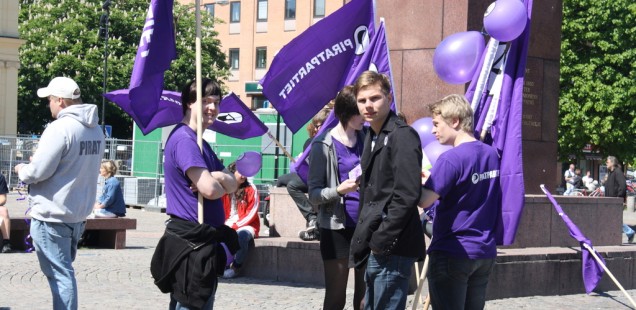Sweden Found an Effective Way of Broadening their Politics | PirateTimes

How Sweden Found an Effective Way of Broadening their Politics
In less than two years the Swedish Pirate Party has grown from a single-issue movement to an all-encompassing party with a growing political platform. All of this was achieved through a democratic process of crowdsourcing, mostly thanks to the party’s new official “broadening blog”.
The Swedish Pirate Party started out in 2006 as a single-issue political party, focusing on only a handful of issues concerning copyright, patents and privacy. In the early years, most members agreed that this was the way to go – they would sail into parliament, change the world and leave content.
After the national election in 2010, in which the party only increased its votes by 0.02 %, more and more members realised that for the party to succeed in the long term, it would have to encompass a broader spectrum of political issues. In 2011 the party board started on a new declaration of principles, which was accepted by members in the spring meeting of 2012. The spring meeting also saw the first new decisions outside of the original focus areas.
In the wake of the spring meeting, party leader Anna Troberg alongside board member Henrik Brändén launched a WordPress blog with the heading of “Nu breddar vi Piratpartiet!” – “Let’s broaden the Pirate Party!”. The blog was opened up for anyone interested – party member or not – to send in posts with suggestions for further political decisions, no matter the relevance to previous positions. The idea was to collect and showcase as many ideas as possible, allowing for discussion in the comments.
According to Troberg, the choice of a WordPress blog has helped in letting anyone join in the conversation. “It’s very simple and yes, sometimes you wish you had something more tailor made for the task, but the brilliant thing is that everybody can use it. No one is left to view the discussions from the sidelines. Sometimes the perfect tool is not the most fancy one, but the one people feel comfortable using.” Members or non-members with political suggestions are free to e-mail these to the administrators, who cue them up for posting.
The blog was met with a hugely positive response, and immediately started updating on a daily basis, with comments per post ranging from just a few to several hundred. A few months in, over a hundred posts and several thousands comments had been posted on the blog. The contributors vary, from our party’s representative in the European Parliament Amelia Andersdotter, to party board members, blogger activists and just regular members or supporters who wish to discuss their idea. All they have in common is a shared will to change the party for the better.
“To my surprise, most submissions to the blog have come from pirates that usually do not make themselves heard”, says Troberg. “I think that’s great. It shows that we have much more brain power than we thought we had.”
As would be expected, the content of the posts themselves can be of varied quality, and vary in the amount of support they receive. Posts such as one asking to throw foreign criminals out of the country because “you don’t commit crimes if you risk having to return to a potential war zone” were heavily criticised but were, nonetheless, kept by the moderators as they wished to let all opinions breathe, good or bad, and let the members sort controversies out democratically. Other posts, such as one on legalising the use of cannabis, divided commentators and bloggers, becoming the blog’s most commented post with over 200 comments.
According to Troberg, no texts have been rejected and no comments have been deleted: “You can express any view you like, as long as you express it nicely. Sometimes we have to tell people to be a little bit nicer to each other, but so far that has been enough. No comment has been deleted and no commentator banned. I’m very happy about this as I feel it’s very important that our new, broader political platform is born out of positivity and agreement and not out of anger and fighting.”
The first results of the blog in the party’s platform are likely to showcase in the member meeting in October, where new political decisions can be suggested and voted on by members.
Featured Image: Pirates Sweden | CC BY-SA 3.0 Kent Holmblad

About Anton Nordenfur
I’m party organiser for the Swedish Pirate Party, and work as a freelancing writer and translator. I’m primarily interested in research politics and LGBTQ rights, and blog in Swedish over at antonnordenfur.com.
All content is CC-BY if not mentioned otherwise. Please link back to us if using content.




















Zbigniew Łukasiak
Don Kongo
Anton Nordenfur
Justus Römeth (@DarthSquig)
Zbigniew Åukasiak
Justus Römeth (@DarthSquig)
Anton Nordenfur
Geir Aaslid
joe col